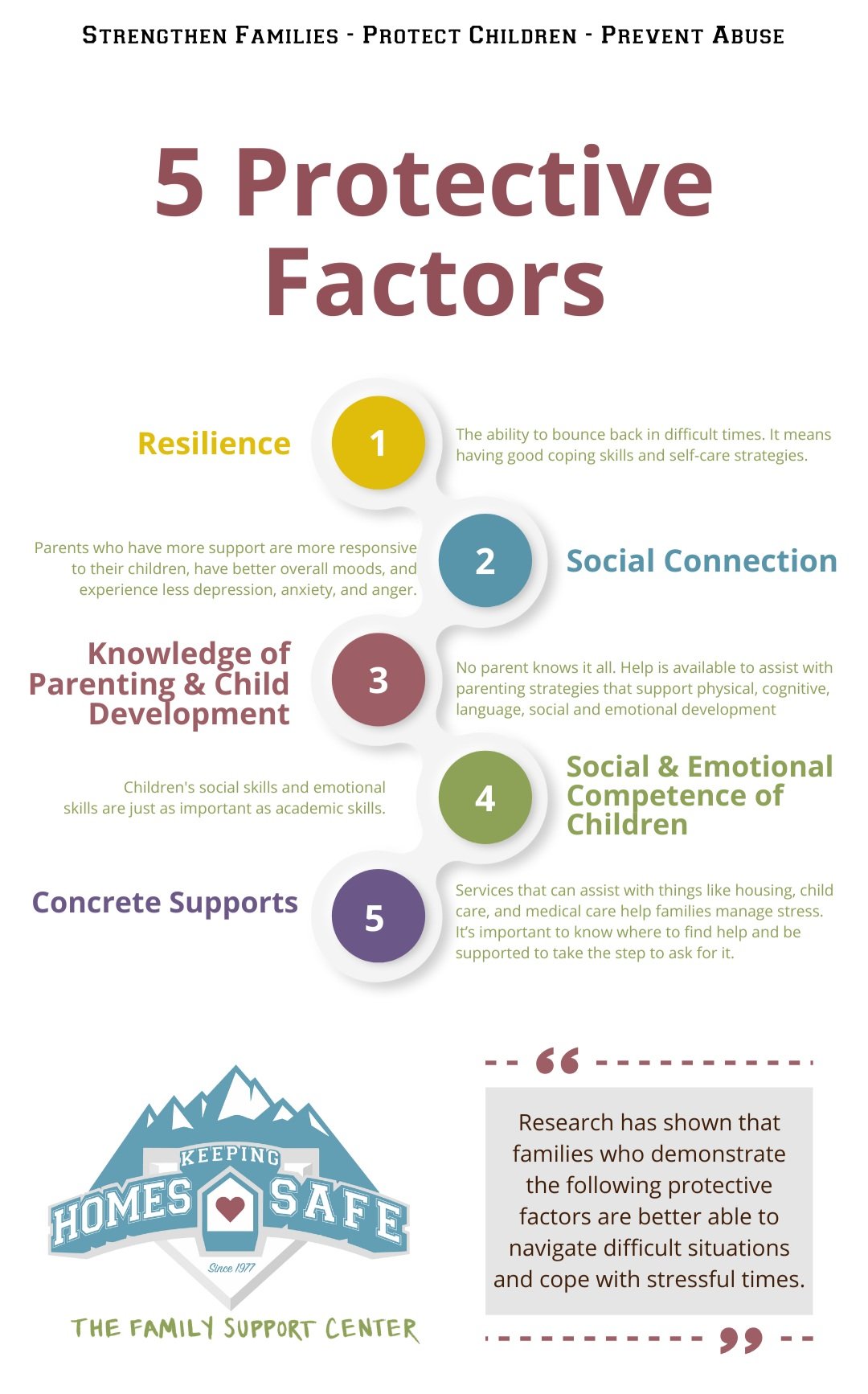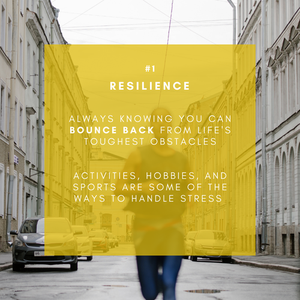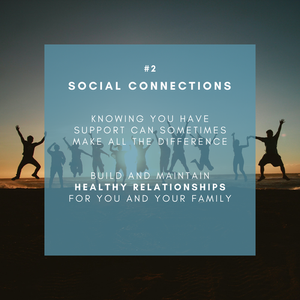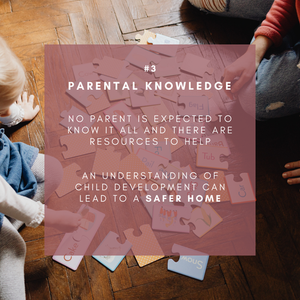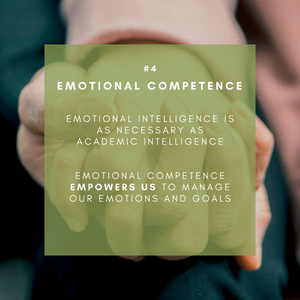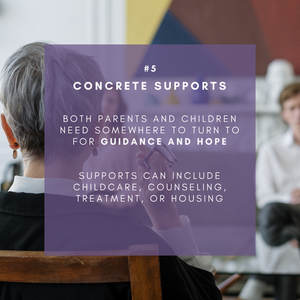The 5 Protective Factors for Resilient Families
The Nation-Wide Framework Proven to Strengthen Families, Protect Children, and Prevent Abuse
What are protective factors?
The 5 Protective Factors is a research-based framework which identifies 5 of the most important aspects proven to minimize Adverse Childhood Experiences (ACEs) by establishing safe and emotionally stable homes.
Abuse and neglect are sometimes not as obvious it may seem and can unfortunately come as the result of new parents simply not having the right tools or support. Parents who develop Protective Factors are able to share with their children the same life skills and positive coping techniques, leading to healthier and more confident families.
Rather than just treating the symptoms of child abuse, the 5 Protective Factors targets the root causes by providing parents the necessary resources and tools to better manage the many stressors of parenthood.
Mental Health Protective Factors
The 5 Protective Factors framework is designed to strengthen the mental well-being of both parents and children to best prevent a pattern of abuse, neglect, and dependency.
4 of the 5 Protective Factors are specifically geared towards bolstering mental health. The 5th Protective Factor, Concrete Supports, aspires to make parents aware of the community services, professionals, groups, and nonprofits available and ready to help.
Just knowing you have strong social and concrete supports can sometimes make all the difference in raising a more confident and mentally healthy home.
Protective Factors Example
Parental Resilience
always knowing you can bounce back from life’s toughest obstacles
Parenting is one of the most joyous and rewarding life experiences, but there is no denying its inevitable challenges and stressors. But how you respond to these stressors is more important to the development of your child than the stressors themselves.
Learning to be a resilient parent means to be a resilient person. Nearly any activity, art, hobby, sport, or musical instrument naturally teaches individuals to develop resiliency and confidence in the face of setbacks.
Confident and resilient parents not only protect their children now, but share with them the same healthy attitudes so they may develop confidence and resiliency into their adulthood.
EXAMPLES of Stressors
Planning for the unexpected means more than just having money saved up for a rainy day. Learning how to mentally and emotionally handle life’s most unexpected situations can be more valuable than money because these skills can’t be bought.
Major Life Event (moving, new job)
Unexpected Life Event (death, loss of job)
Poor Relationships or Isolation (divorce)
Lack of Support or Social Services
Children with Behavioral Issues
Substance Abuse History
Past Trauma
Pervasive Abuse In & Out of Home
Social Connections
knowing you have support can sometimes make all the difference
When parents have a sense of connectedness to their family, peers, and community they feel a sense of security and comfort knowing there are others to confide in during life’s ebb and flow.
Like children, parents also need people to care about them and offer a genuine listening ear. Sometimes this can be found in a true friend or loved one and sometimes it is best found in a professional setting.
Remember that your personality and habits will model after the 5 people closest to you and, if you’re looking to be healthy, happy, and strong, then surround yourself with those types of people for the good of you and your family.
Examples of healthy social connections
Understanding the impact and weight of your social connections is one of the many emotional milestones of adulthood and such a realization will immediately begin to benefit your family, career, physical health, and overall mental well-being.
Trusted Loved Ones and Mentors
Supportive Friends and Peers
Church and Volunteer Groups
Neighbors and Co-Workers
Community Programs / Rec Center
Sports Teams and Workout Friends
Support and Recovery Groups
Professional Counseling / Therapy
Knowledge of Child Development
no parent is expected to know it all and there are resources to help
Whether a parent, educator, or childcare provider, learning some of the fundamentals of normal child development can often help bridge the gap between stressed or frustrated adults and the children in their care.
Take for instance, a motorist who has taken the time to learn their vehicle inside and out. They are generally better owners and operators for having understood the strengths and limitations of their vehicles while also being better prepared for accidents.
Similar to learning automotive skills, there are countless online and in-person resources, parenting classes, and professionals to help guide us towards being a better prepared childcare provider. Remember that perfect parents aren’t born, they’re made.
Examples of developmental skills and milestones
As children quickly grow, parents should educate themselves about the developmental stages to best meet their child’s constantly evolving needs from infancy to up into their teen years.
Basic Motor (Crawling, Running)
Fine Motor (Writing, Drawing)
Speech and Language
Cognitive and Intellectual
Social and Emotional
Empathy
Abstract Concepts
Understanding Consequences
Social and Emotional Competence
EMotional intelligence empowers us to manage our emotions and goals
Humans are a biosocial species, meaning that our survival is as every much dependent on biological circumstances as our social circumstances. The compounding benefits of a socially and emotionally well-adjusted home can be experienced for a lifetime.
The Theory of Multiple Intelligences (1983) believes that there 8 different ways someone can be defined as “intelligent”, two of which are social (interpersonal) and emotional (intrapersonal) forms of intelligence.
The old reading, writing, ‘rithmatic model has hindered us from valuing other types of intelligences that we as a society admire and need. The world benefits from compassionate, empathetic citizens every bit as much as it does scientists and doctors.
Examples emotional intelligence
Like any other skill in life, social and emotional competence can be learned by anyone willing to make the effort. Being able to listen, empathize, and take responsibility is an incredible feat of strength of which not everyone is capable.
Setting Healthy Boundaries
Being A Good Listener
Ability to Make Mistakes
Ability to Take Responsibility
Ability to Take Criticism
Ability to Share Feelings
Ability to Empathize with Others
Ability to Build Rapport
Concrete Supports
Both parents and children need somewhere to turn to for support and guidance
Every family will experience their own unique challenges and stressors throughout their lives. Luckily, there are several resources and services available in your community to help such as local government, churches, support groups, or nonprofit organizations.
Concrete supports include a nearly endless list of public and private services such as after-school recreation centers, childcare, mental health counseling, parenting classes, food banks, and housing assistance to just name a few.
Parents experiencing any type of stress should never be afraid to ask for help. Whether it be the help of a friend, community resource, professional, or nonprofit, there are more places to turn for support than you may realize.
examples of concrete supports
A reliable network of concrete supports provides families the necessary resources to cope, and recover, from nearly any situation; helping to assure mental well-being as much as physical.
Childcare Assistance
Legal Assistance
Food Banks
Nonprofit Organizations
Childcare Assistance
Legal Assistance
Food Banks
Nonprofit Organizations
Family Support Center in the News Promoting Protective Factors
Family Support Center and Salt Lake County partners to strengthen families and prevent abuse in Salt Lake
FSC Executive Director, Jocelyn de la Rosa, discusses building healthy, resilient families with ABC 4 Utah
Complete press conference with Mayor Jenny Wilson and other officials for Child Abuse Prevention Month
5 Protective Factors During COVID-19
How A Pandemic strengthened the family support center’s ability to apply protective factors
April 8, 2020
Mental Health Director
These past few weeks, I’ve thought to myself several times … “is this real? … is this really happening?”
When I let myself get to this point of thinking then the wave of fears and stresses about the future come rolling in. That’s when I have to force myself to concentrate on the positive things around me and the things that I’m grateful for! For example, how my husband and I are both working from home and we get to spend soooo much time together!
Everyone is feeling the effects of COVID-19. We are all dealing with the stresses and changes that have been brought into our lives as a result of this pandemic. The future has a tinge of uncertainty that wasn’t felt there before.
Hopefully, you are saying to yourself … “yes, I know what she’s talking about, but what could she possibly say to help that I haven’t heard already”… I have 5 Protective Factors up my sleeve and I’m going to show you how to use them!
Parental resilience
Social Connections
Knowledge of Parenting and Child Development
Social and Emotional Competence of Children
concrete supports in time of need
Let’s face it, we ALL NEED these! Let me break them down so we know how to use them and in turn HELP OURSELVES and strengthen our families. Nobody can do things for us in our lives,we are the captains of our own ships!
Parental Resilience is the ability to be strong yet flexible. Parental resilience is the ability to manage and bounce back from any type of challenge! In action it looks like: solving problems, building and sustaining trusting relationships and then knowing how to seek help when we need it. How are you managing your stress right now?
During the first two weeks of the school shut down, I began hardcore stress eating. Then I realized that eating like this was not helping and was instead making me feel worse! During my years of college, (those were so stressful to me because of assignments like this! Writing yikes!) I learned that I needed to get outside and go for a jog or a hike or some kind of physical activity as an outlet to help manage my stress.
What increases your capacity for Resilience?
If you don’t know, try a bunch of things out and see what helps! Maybe listening to music, going for a drive, laying outside on the grass in the sunshine, watching a movie or favorite TV show, going on a bike ride, writing in a journal, drawing, talking with a friend, or taking a bubble bath are a few ideas to get you started.
2. Social Connections are networks of support! These networks can be found in friends, family, neighbors, and community members. Take a second and think of what kinds of groups you are a part of? Whether it be religious, political, or just for fun-we all need social connections!. I know right now might feel super isolating because of COVID-19, but the flip side is we are all working TOGETHER in that process of isolation to combat and fight this pandemic! Brothers in arms, on the front line kicking the butt of COVID-19, WHO-RAAA (punching of fist up in the air is required when reading the WHO-RAAA … I’ll wait for you to do it again;)
Who is your “brother in arms'' that you call right now for support? Who you gonna call?
…… GHOST BUSTERS! Lol! I couldn’t resist! Write a list of all the people in your circle of support. Family members, friends, neighbors, classmates, business or religious associates are just a few ideas to get you started. It will probably surprise you how many people you can come up with once you start really thinking and writing them down!
3. Concrete Support in Times of Need … We all need help sometimes. There are times when we feel in over our heads and close to drowning. Whether it’s addiction struggles, domestic violence, mental illness, and/or meeting our basic economic needs. If you have ever been on https://211utah.org, a website full of resources to help with housing, food, medical, domestic violence just to name a few, then you know there are plenty of resources out there! At the same time, you may also know how overwhelming it can be to find the right resource for your needs. The best way to get started is to just start! Start reaching out! Most likely if you reach out to the wrong place, they will refer you to a more accurate place until you find the one!
4. Knowledge of Parenting and Child Development … We all know how children grow! As soon as we get used to one stage of life, they are growing into the next stage of development. Then add on top of that, that each child is different and has different needs. Understanding the varying stages of child development helps parents to have the right kinds of expectations for their kiddo’s behaviors and abilities. If you grew up in a generational pattern of harsh discipline or other negative childhood experiences then it is up to you to break that pattern. By breaking that pattern, you will have a better chance at meeting your parenting goals of raising a happy, healthy, and confident child who becomes a successful adult.
Again, there are tons of resources out there to help you gain parenting tools.
These come in all different platforms you can use to learn, such as: reading books, taking a class, listening to a podcast, looking up different scientific studies and data collected or having a mentor.
5. Social and Emotional Competence of Children… This is where you become their first teacher! Your littles will be like the pet parrot you never knew you had. They mirror back and learn everything from you, whether you consciously meant to teach them that little diddle or not ;) Self-regulation and communication skills go hand in hand with creating a positive impact on your children's relationships with their families, peers, and other adults. Early identification of any struggles in this department and intervention helps keep development on track.
Today’s current events are providing an excellent opportunity to be their teacher, not necessarily just math and science but these essential coping skills.
In the moment of a tantrum or meltdown, it can be very difficult to be calm, but the calmer you are in dealing with their tantrums, the calmer they will react. Remember to put yourself in their shoes and ask yourself, what does my baby need? Underneath every misbehavior is a need that needs to be met.
Knowing where you are at with each one of these 5 Protective Factors is the first step to strengthening your family! YOU WON’T BE PERFECT at any of them, so don’t be too hard on yourself.
Here at the Family Support Center, our mission is to strengthen families. Amidst the craziness of COVID-19, we are still here to help!
